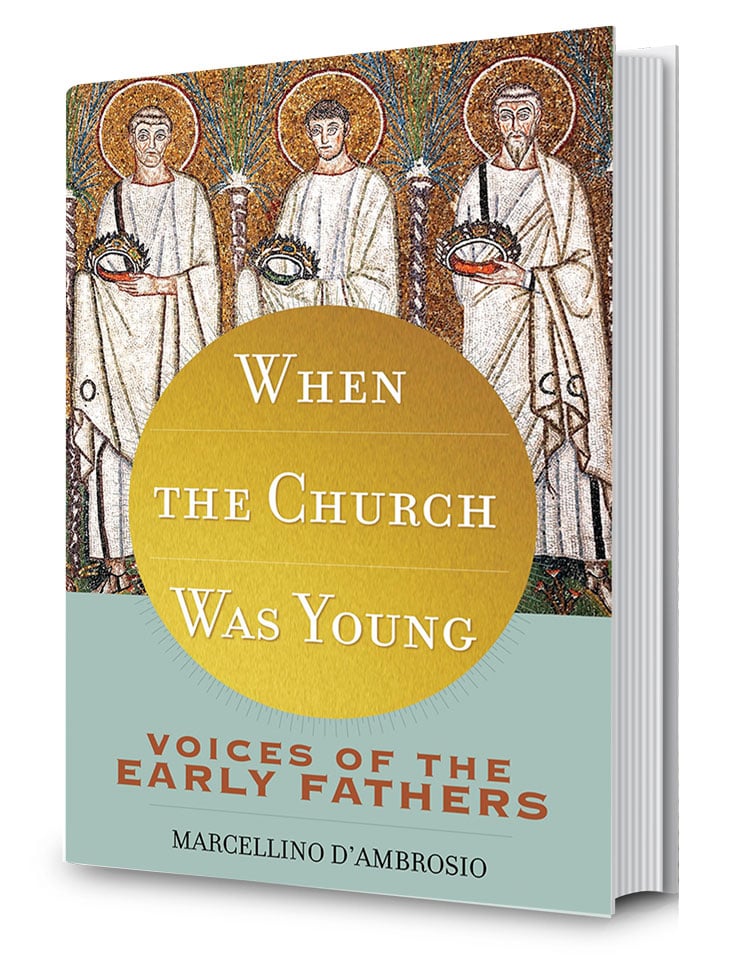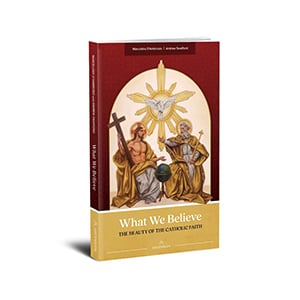
Shop
When the Church was Young: Voices of the Early Fathers
$21.99
Dr. Marcellino D’Ambrosio
Paperback: 320 pages – Each Copy Autographed by Dr. Italy!
A society characterized by loss of respect for life, violence, exotic religious cults, sexual promiscuity, homosexuality, and even pedophilia. Sound familiar? This was the world of the early Church Fathers. In his engrossing new book, When the Church Was Young: Voices of the Early Fathers, Marcellino D’Ambrosio brings out the colorful personalities of these dynamic Christian leaders and makes their rich teaching accessible, enjoyable, and relevant to the challenges we face every day.
The Fathers of the Church succeeded in bringing a pagan society to Christ. If we pay attention to what they taught, we will succeed in doing the same for our own increasingly de-Christianized society.
Description
A society characterized by loss of respect for life, violence, exotic religious cults, sexual promiscuity, homosexuality, and even pedophilia. Sound familiar? This was the world of the early Christians. In his engrossing new book, When the Church Was Young: Voices of the Early Fathers, Marcellino D’Ambrosio brings out the colorful personalities of these dynamic Christian leaders and makes their rich teaching accessible, enjoyable, and relevant to the challenges we face every day.
The Fathers of the Church succeeded in bringing a pagan society to Christ. If we pay attention to what they taught, we will succeed in doing the same for our own increasingly de-Christianized society.
When the Church Was Young: Voices of the Early Fathers Paperback: 320 pages – Each Copy Autographed by the author!






Admin –
I have read other books on the early Church and early Church Fathers and they were fine, but this book brings both to life. Each Father has an intriguing and compelling story that is told in a conversationalist manner so as to leap off the page. For example, when threatened with torture and death, Justin Martyr responds (page 57) to the prefect of Rome by saying, “We ask nothing better than to suffer for the name of our Lord Jesus Christ and so to be saved.” These men are not contained on dusty pages in a dusty old history tome; these men are alive today in the living and breathing Christian Church.
This book does an outstanding job explaining heresy’s within the early Church such as Gnosticism and Aryanism and shows how each was debunked and defeated and by whom. We present day Christians take difficult topics like the Trinity for granted. This book is a reminder of how it wasn’t always so and how Christian thought solidified through apostolic Tradition.
Perhaps most importantly, this book reminds us that early Christians were willing to die for their faith. How many present day Christians are ready to do the same? In those days it was expected and embraced.
The pithy recap of the apostolic Tradition’s points of convergence in Chapter 26 is brilliant and concise.
The early Church Fathers would be outraged to see the many divisions within present-day Christianity. Their words and, in many ways, this book is a call for unity. Thank you, Dr. D’Ambrosio for writing and compiling it.
Judy Landrieu Klein –
Marcellino D’Ambrosio is a wonderful teacher of the faith and of history, who brings both to life with interesting, easy to read stories that both enlighten the reader and enhance their love of Christ and the Church. Highly recommended!
Patrick Madrid –
When the Church Was Young is truly superb. Marcellino D’Ambrosio brings ecclesiastical history to life with a clarity and vitality seldom achieved in this field. I’ve read many books on early Church history and can affirm without hesitation that, for a popular audience, this one ranks at the top of the list because of its straightforward prose, rich yet accessible content, thoroughness, and honest presentation of the facts.
Liz Lantigua –
What is so fascinating about history is that in learning about the past we unlock the mysteries of the present. When the Church Was Young, Voices of the Early Fathers by Marcellino D’Ambrosio is an engaging book that explains the “Why” of many of our Catholic practices, traditions and beliefs in its historical context. Thanks to the enticing writing style of its author it becomes a page turner!
D’Ambrosio’s writing has always fascinated me because he can engage the reader in the first paragraph and write about the most complicated things in the simplest of forms. I found myself amazed that obscure names of early theologians had actual significant contributions to how we practice our faith today. Proof of how consistent is the Catholic faith that can be traced back to its beginning and its truths do not change depending on polls or popular opinion.
For example: How Origen, introduced to Christian theology the word “consubstantial”, which we recite in the daily Sunday creed, meaning that the Son is one in being with the Father. Irenaeus, originally from Asia Minor, dismantled the doctrines of the Gnostics, with the argument if these doctrines would have come from Jesus wouldn’t He had entrusted them to his 12 apostles whom he personally selected. Irenaeus could track the pope of his day all the way back to Peter- this apostolic succession solving the problem of which are the true and authoritative apostolic writings.
For me it was an “aha” moment from Chapter to Chapter while it explained with simplicity the ancient origins of the veneration of relics (how devotion to saints, saints’ days and relics are not as some may think pagan practices imported into Christianity by Constantine), how indeed communion was taken in the hand in the early church and the custom of baptism even to infants. If you want to understand, accurately explain and at times defend the Catholic faith this is the book to read!
Pastor Bob Bonnell –
You almost feel as if the author Dr. Italy, (Dr. D’Ambrosio) turns over the tour of the Early Church to the Holy Spirit. As I read I was quickened by the sense of profound truth being offered to me. His astute and gracious pen left deposits of treasure from each chapter of the Early Church. Marcellino enriches us through his own brokenness and kindness as his voice whispers to us about the battles and those who waged them (most at the cost of their life) to understand the mystery of the Holy Trinity and the dual nature of Christ. The writers he writes about were also pens in the hand of God. Marcellino writes like God gave him an assignment to remind us in the third millennium what it cost those in the first millennium what Communion means. He gives his account of those brothers who the Holy Spirit used to insure that the Lord’s Table would always offer seating to the hungry, thirsty, weary, poor and hopeless. We see the powerful testimony of Jesus as shared by the saints and apologists of the Early Church. I felt a bit like Marcellino was my tour guide to introduce me to other members of Our Family who I really didn’t know or understand 42 years after meeting Our Savior. There was no Bible for the first 400 years – so Dr. Italy divulges how certain tenets of our faith emerged and what it cost them to pass it on. As an Anabaptist, I must say, that my Roman Catholic brother gave me more reasons than I can number to further embrace the Communion of the Saints as an activist for John 17. We are living in the eyes of a great cloud of witnesses who never knew division only grace that knew how to surrender so that we might also learn to embrace each other in Christ. This book should be on every Christian Bookshelf and every Pastor and Bishop’s library of ‘at hand references’ including Orthodox, Roman Catholics, Protestants, Evangelicals, Charismatics and other Seekers of The Way in every language. Perhaps the ‘best yet’ primer on the Early Church, Church Fathers, the 1st Ecumenical Councils and impact of the struggle for Orthodoxy and Orthopraxis.
Rosemary Gatti –
In a time when many popular beliefs promise easy answers, this book can genuinely guide people searching for greater meaning in their spiritual lives. Dr. D’Ambrosio navigates our early spiritual heritage with a clarity that can only come from deep communion with, and love for, the church and her people. A living and truthful awakening of the past that ignites the spirit and opens the heart of today.
Jeff Miller –
When it comes to books on the Early Church Fathers there seems to be an increasing wealth of good books on the subject. One of my favorite books in this area is Rod Bennett’s “Four Witnesses: The Early Church in Her Own Words”. The reason I so loved this book is that Rod Bennett is a natural storyteller along with being a good historical researcher. His writing not only brought these men alive, but the historical era as well.
So I was delighted to find another book on the Church Fathers that was as readable as “Four Witnesses” because of storytelling and grasp of the history. This book is Marcellino D’Ambrosio’s “When the Church Was Young: Voices of the Early Fathers.” This book covers the period from Saint Ignatius of Antioch to St. Gregory the Great. The actual category as to the time period of early Church Fathers is rather loosely defined and subjective as the the end of it. Marcellino D’Ambrosio offers a good definition. “The Church Fathers are those great Christian writers who passed on and clarified the teaching of the apostles from approximately the second through eight centuries.” This definition makes more sense when you think of early ecclesiastical writers such as Origen and Tertullian as it does not rely on the writers sanctity or full orthodoxy.
I am generally read in this era of history and so the stories of the men contained were not unfamiliar to me. Still I learned a lot more along with more being put into context. This book is much more than a historical litany of facts. The presentation brought to me a larger view and helped me integrate the information I already knew with the wealth of stories regarding these men. Plus with enough of their writings to want you to go to the sources and read more. This was totally an engaging read that will not just pass out of my memory in a fog of facts. When I compared this to Rod Bennett’s book I consider that high praise indeed and these two books together certainly have my recommendation.
Sandro Gregorat –
This Book is a rare combination of entertainment and learning. It is dense of profound concepts but at the same is rich in spiritual emotions. You feel that the author is moved by the examples of faith that he describes.
Often the words talk straight to your heart after reaching your mind. As the title says this book is about the beginnings of the Christian church. It was a time of trials and tribulations for the young church. The Roman persecutions kept coming and when finally the dangers disappeared dissent broke among Christians and for a while a debate raged over the nature of Jesus Christ. This is the story of the fathers of the church, the ones that guarded and passed down the words of the apostles, defending their integrity and clarifying their meaning. Many ancient Christian giants speak to us through the power of these printed words. The subject matter is at the same time history and theology but this is definitely not an abstract study on how the Christian doctrine evolved. Furthermore here we do not find the cold and detached approach of the historian. Here we see the fathers of the Church come alive with all of their virtues and defects. We listen to their words and we see them in those ancient times. This is real life reenacted through the pages of the book. Let me add that for the first time ever I was able to read the never ending saga of the Arianism with no pain and without having to go back and forth to double check details of Greek terminology (homoousios, homoiousios etc..) as I had to do the other times I ventured in the same territory.
Dr. Mike Cymbor –
I have read other books on the early Church and early Church Fathers and they were fine, but this book brings both to life. Each Father has an intriguing and compelling story that is told in a conversationalist manner so as to leap off the page. For example, when threatened with torture and death, Justin Martyr responds (page 57) to the prefect of Rome by saying, “We ask nothing better than to suffer for the name of our Lord Jesus Christ and so to be saved.” These men are not contained on dusty pages in a dusty old history tome; these men are alive today in the living and breathing Christian Church. This book does an outstanding job explaining heresy’s within the early Church such as Gnosticism and Aryanism and shows how each was debunked and defeated and by whom. We present day Christians take difficult topics like the Trinity for granted. This book is a reminder of how it wasn’t always so and how Christian thought solidified through apostolic Tradition. Perhaps most importantly, this book reminds us that early Christians were willing to die for their faith. How many present day Christians are ready to do the same? In those days it was expected and embraced. The pithy recap of the apostolic Tradition’s points of convergence in Chapter 26 is brilliant and concise. The early Church Fathers would be outraged to see the many divisions within present-day Christianity. Their words and, in many ways, this book is a call for unity. Thank you, Dr. D’Ambrosio for writing and compiling it.
Ed –
Dr. Italy brings the early explosion of Christianity into focus! I absolutely loved the way he presents and helps to understand the historical milieu. It highlights what we are truly missing now in our knowledge and liturgy. Thanks, Doctor! We do need a follow-up though for the next 3-400 years…
Dr. Brian Kiczek –
This is a quote that I came up with after reading the inspiring book by Marcellino D’Ambrosio titled “When the Church was Young”. I realized quickly how little I knew about the Church’s History and how important it is to know Christ Himself in His Body, the Church. The Church is the Body of Christ as the Bible clearly tells us. (1 Cor 12:27, Romans 12:4, Colossians 1:24) Thus if we do not know the Church or it’s history we do not know Christ.
Well this book will take you out of your ignorance and help you learn about Christ and His Body the Church. You will learn it in a fun and engaging way that keeps you turning the pages and before you know it, your finished and you want to know more and more about the amazing church that the Catholic Church is!
Steve Rossi –
Dr. D’Ambrosio has a spectacular way of educating the reader and making you laugh at the same time. I have heard and read about most of these early fathers of the Church, but never had such an appreciation of what they had done for us until reading Marcellino’s book. I highly recommend you buy this treasure and his other very humorous fact-filled accounts of real-life Catholics in all of his books!
Mary McKay –
Many books on the early Church fathers include biographical and other material in addition to the chosen selections, but overall they tend to be quite dry. Marcellino D’Ambrosio has made the early fathers come alive in this very readable, and enjoyable book. One begins to see the fathers as people who, while imperfect, clearly tried to bring clarity and unity to the Church. Yes, the book is written from a Catholic perspective, but you should not let that keep you from reading it if you are not Catholic.
David Bates –
There are several things which I think are uniquely achieved in this book. The first thing which is worth commending is the way in which the author manages to connect the stories of each Early Church Father into an overarching narrative. This is extremely helpful in keeping the chronology and flow of events clear in one’s head.
The next thing is that, although I would say that this is an introductory book, it is absolutely packed with little nuggets of information I hadn’t come across before. In fact, every time I found one of these gems, I put a little post-it on the page and the book is now littered with these slips of paper.
The final thing about this book which sets it apart from others is in the area of what you might call “application”. At the end of each chapter, Dr. D’Ambrosio connects the events, issues and themes discussed in that chapter to both contemporary secular society and to today’s Church. In these sections, he shows how the lessons learned in the early centuries can be applied to today’s world and how the wisdom of the Fathers is the sage advice we need to hear as we attempt to remedy contemporary dilemmas and struggles.
Upon completing this book I immediately purchased two more copies, certain that I would quickly find homes for them. No sooner had they arrived, I had put them into the hands of friends, enthusiastic to read them after hearing my glowing reports on Facebook.
All in all, I loved this book. It’s an excellent introductory guide to the Fathers which is never-the-less jammed full of valuable material presented in an accessible fashion. Dr. D’Ambrosio is right, history shouldn’t be boring, and neither is this book, thanks to his excellent retelling of our family story.
Matthew Bush –
5 stars Beautiful Book!
Would highly recommend it to anyone interested in learning about Church History, whether Catholic or Protestant. Have you ever wondered what the first couple of centuries of the Church were like after Christ’s ascension? This will show you how it came about, the witness of the early martyrs, the struggles it went through, the doctrinal development and so much more! Easy and clear read!
Joseph Visci –
WTCWY is a very well written, informative, fast paced, and thorough walk through the events of the early church. Dr. D’Ambrosio walks the reader through this crucial period in church history by taking a close look at the times, the questions, the ideas, the issues, and in particular the people who were in the crucible, the church fathers. The author details their background, their connections to one another, as they considered all the facts and used reason to answer questions and to defend the teachings of the faith and its mysteries as handed down by the apostles. Every step of the way, the book also illuminates the facts and arguments of those who espoused their own contrary beliefs and why the church father’s arguments prevailed.
This was all clearly and very well laid out by the author, with the facts, events, issues, and arguments placed in historical context adding to the reader’s appreciation and understanding of the events. I found this refreshing in a time when historical events and their meaning are often skewed by viewing events in current rather than historical context. Dr. D’Ambrosio’s enthusiasm and admiration for the courage, intellect, and contributions of these fathers, who often found themselves speaking out against those in power rather than going with the vox pop or conventional wisdom is appealing and makes the book entertaining as well as enlightening. All this makes the book highly enjoyable – and relevant, as it reveals that the church today teaches the same faith as the early church, and lends to confidence in its timeless transcendent mission.
I was prompted to write this review because when I came back to buy a kindle version of this book (I received the paperback as a gift), the review that popped up alleged that the book was inaccurate because not everyone agreed with the theological conclusions, and “case closed” was inappropriately used in connection with mysteries. The fact is however, that the author never said everyone agreed with the conclusions, and never indicated “case closed” lessened the mystery. Neither does it lessen the truth of a matter that some refuse to acknowledge it. It especially does not mean that the matter was unfairly or improperly presented by the author. What is disappointing is that the reviewer acknowledged the detail, accuracy, and quality of Dr. D’Ambrosio’s content – and the arguable correctness of the church fathers’ theological conclusions. As an attorney, parent, and person, I respectfully suggest that unfounded statements espoused as conclusions, and blaming the messenger for a message the reader appears to dislike, have no place in a review.